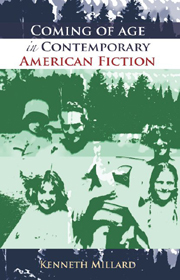Book contents
- Frontmatter
- Contents
- Acknowledgements
- Introduction: Contemporary Coming of Age – Subject to Change
- 1 In the Name of the Father
- 2 I Change Therefore I Am: Growing up in the Sixties
- 3 Citation and Resuscitation
- 4 Language Acquisition: Life Sentences
- 5 Lexicon of Love
- 6 Memoirs and Memorials
- Conclusion
- Bibliography
- Index
2 - I Change Therefore I Am: Growing up in the Sixties
Published online by Cambridge University Press: 12 September 2012
- Frontmatter
- Contents
- Acknowledgements
- Introduction: Contemporary Coming of Age – Subject to Change
- 1 In the Name of the Father
- 2 I Change Therefore I Am: Growing up in the Sixties
- 3 Citation and Resuscitation
- 4 Language Acquisition: Life Sentences
- 5 Lexicon of Love
- 6 Memoirs and Memorials
- Conclusion
- Bibliography
- Index
Summary
In terms of the social history of the United States in the late twentieth century, the decade that is most often singled out as exceptional is the 1960s. It is generally accepted that the 1960s was a time of unprecedented social upheaval in the United States, and that change had its focus in civil rights, the emergence of militant feminism, and the student protests against the war in Vietnam. The 1960s is typically characterised as a period when the radical challenges of the ‘counterculture’ were made to the social institutions of the United States, and violent confrontations of many kinds were symptomatic of fundamental political upheaval. David Burner characterised it as a time of ‘a ferocity of debate, a challenging of conventions, and a testing of visionary hopes’ (Burner 1996: 3). For the novelist at the end of the twentieth century, this was the decade whose unique character most strongly informed the identity of the United States.
Both of the novels of this chapter use a dispassionate third-person perspective to offer a critique of the legacy of the 1960s as they understand it from their different view points. Both novels ask: what specific features of the 1960s gave that decade its particular character, and how is the late twentieth-century the heir to those features in ways that it is now possible to evaluate? Both of these novels offer representations of coming of age that show how adolescence was informed by that historical moment, but which also suggest ways in which their contemporary moment is still finding ways to understand and come to terms with how modern adults are the product of that historic decade.
- Type
- Chapter
- Information
- Coming of Age in Contemporary American Fiction , pp. 46 - 71Publisher: Edinburgh University PressPrint publication year: 2007



